|
|
|
Sort Order |
|
|
|
Items / Page
|
|
|
|
|
|
|
| Srl | Item |
| 1 |
ID:
153611
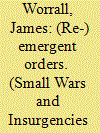

|
|
|
|
|
| Summary/Abstract |
The concept of order is often neglected in the study of conflict – seemingly such a ‘disordering’ process. With the recent increase in the examination of rebel governance however, bringing order back into our understanding of rebel and insurgent groups has much to offer in exploring the everyday politics which connect authorities, rebel movements and the population itself, in a complex mass of intersubjective and power-based interactions and negotiations. Rebels both shape and are shaped by existing forms of order in complex and ongoing ways. This article explores how varying elements interact in the negotiation, framing and enforcement of order and develops an original analytical framework to examine the perpetual negotiations of rebel movements in their attempts to cement their control.
|
|
|
|
|
|
|
|
|
|
|
|
|
|
|
|
| 2 |
ID:
137717
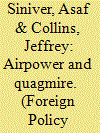

|
|
|
|
|
| Summary/Abstract |
This paper assesses the role that analogical reasoning played in Israel's decision making during the 2006 Second Lebanon War with Hezbollah. Two analogies seemed to dominate internal deliberations: the “air power superiority” analogy which drew on more than a decade of developments in military theory and the air-based campaigns of the two Gulf wars and the Balkan wars of the mid-1990s and late 1990s; and the “Lebanese quagmire” analogy which drew on Israel's own traumatic experience of Israel following the its first war in Lebanon in 1982. The misuse of these analogies by the Israeli political–military leadership during the war produced a myopic approach which advocated an almost total reliance on air power rather than ground maneuver to win the war and refrained from using ground forces for fear of entering another bloody and unpopular war in Lebanon. The constraining power of these analogies prevented the consideration of alternative courses of action or the effective calculation of cost-benefit analysis during the war. Whereas previous studies of the war provided various explanations to singular decisions or episodes, this paper shows that the air power and quagmire analogies contained the conceptual boundaries of Israeli decision making during the war and thus best explain its attraction and limitations.
|
|
|
|
|
|
|
|
|
|
|
|
|
|
|
|
| 3 |
ID:
121500
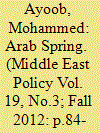

|
|
|
| 4 |
ID:
097900
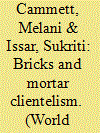

|
|
|
|
|
| Publication |
2010.
|
| Summary/Abstract |
In plural societies, social welfare can be a terrain of political contestation, particularly when public welfare functions are underdeveloped and ethnic or religious groups provide basic social services. It is well established that such organizations favor in-group members, but under what conditions do they serve out-group communities? To address this question, the authors compare the welfare programs of the predominantly Sunni Muslim Future Movement and the Shia Muslim Hezbollah in Lebanon. Although they operate under the same institutional rules and economic contexts and boast the largest welfare programs in their respective communities, the Future Movement aims to serve a broader array of beneficiaries, including non-Sunnis, whereas Hezbollah focuses more exclusively on Shia communities. Based on analyses of an original data set of the spatial locations of welfare agencies, qualitative data from interviews with providers and beneficiaries, and case studies of areas where the two parties established and did not establish welfare agencies, the authors argue that distinct political mobilization strategies-whether electoral or nonelectoral-explain different patterns of service delivery across the two organizations.
|
|
|
|
|
|
|
|
|
|
|
|
|
|
|
|
| 5 |
ID:
097172
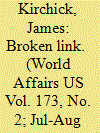

|
|
|
| 6 |
ID:
098085
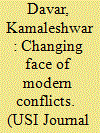

|
|
|
| 7 |
ID:
132476
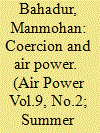

|
|
|
|
|
| Publication |
2014.
|
| Summary/Abstract |
Coercion has been the subject of many a study. To coerce an adversary's thought process and actions to one's own advantage is its end game. Paradoxically, there needs to be a con?uence of interests for discord to occur.' Coercion is not necessarily of the military kind only; in fact, a host of other measures constitute many permutations of actions that can be used to coerce an adversary's decision-making calculus. The North "Vietnamese took on the American military might in their unification effort, and movements and groups like Hamas and Hezbollah periodically fight the Israelis despite the military asymmetry that exists between the two; and the indigenous Afghans, in the long run, were not overawed, first by the might of the Soviet Union and then the Americans. In fact, one study suggests that the initiation of approximately 30 percent of conflicts has been done by the weaker party? Why does this happen and where does air power fit in the equation?
|
|
|
|
|
|
|
|
|
|
|
|
|
|
|
|
| 8 |
ID:
189936
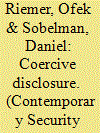

|
|
|
|
|
| Summary/Abstract |
Can intelligence serve as a coercive instrument in international relations? While coercion literature mostly addresses military and economic means, this article argues that coercion can also include the deliberate public disclosure of intelligence. Intelligence can be employed to threaten adversaries, reduce their latitude, and force them to adjust their plans and operations. Additionally, intelligence disclosure can be used to mobilize domestic and international audiences and make others align with a certain narrative and alter their policies accordingly. Still, coercive disclosure can fail or succeed only partially against a determined opponent or a target that is resilient to public and international pressure. To demonstrate the workings of coercive disclosure, we analyze Israel's campaign, beginning in 2017, against the Lebanese Hezbollah’s missile manufacturing program and Turkey's coercive campaign vis-à-vis Saudi Arabia and the United States following Jamal Khashoggi's assassination in 2018.
|
|
|
|
|
|
|
|
|
|
|
|
|
|
|
|
| 9 |
ID:
110460
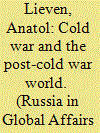

|
|
|
|
|
| Publication |
2011.
|
| Summary/Abstract |
Rather than a future in which Chinese hegemony will replace that of the United States, we seem to be rapidly entering a world in which no country will exercise anything resembling true world leadership. This bears a sinister resemblance to the 1920s, when the United States replaced Britain as the world's leading economic power, but was wholly unwilling to shoulder additional burdens of global leadership.
|
|
|
|
|
|
|
|
|
|
|
|
|
|
|
|
| 10 |
ID:
171053
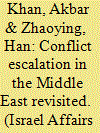

|
|
|
|
|
| Summary/Abstract |
This article argues that state sponsorship of terrorism is a by-product of conflicting relations between states that are generally hostile towards each other. States harbour and drive non-state actors, aiming to create security concerns to the target states, which provoke the target states to take retaliatory actions against the host and/or the terrorist group in a bid to avoid destabilization, uncertainty, and a possible shift in the balance of power between the sponsoring and target state. At this juncture, state sponsorship of terrorism contributes to escalating the conflict. Hence, this type of terrorism should not be treated as a distinct form of violence but as a corollary of interstate rivalries. Iran’s sponsorship of Hezbollah and the Houthis against the backdrop of its rivalry with Israel and Saudi Arabia offers a vivid demonstration of this escalatory dynamic.
|
|
|
|
|
|
|
|
|
|
|
|
|
|
|
|
| 11 |
ID:
104214
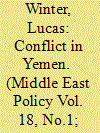

|
|
|
| 12 |
ID:
103239
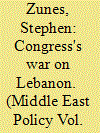

|
|
|
| 13 |
ID:
113289
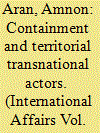

|
|
|
|
|
| Publication |
2012.
|
| Summary/Abstract |
Containment has been salient in intellectual and policy debates for 60 years. It informed US foreign policy towards the USSR and, later, the so-called rogue states. The endurance of containment beyond the Cold War suggests that it possesses the quality of transferability, the capacity of a grand strategy from the past to transcend the circumstances that gave rise to it, to suggest what should be emulated and what avoided in future policies. Drawing on the notion of transferability and on the method of structured, focused comparison, this article uses Israel's foreign policy towards Hezbollah and Hamas to argue that containment is transferable from the state level to a state/territorial transnational actor (TNA) relationship, albeit with permutations. This argument is examined in relation to four issues: the circumstances under which containment arises; its applicability to territorial TNA; the objectives sought by implementing containment; and the role of legitimacy as a component of containment. In so doing the article seeks to make a contribution to the debate on containment. While there is a rich literature on state containment, research on containing territorial TNA has been extremely limited.
|
|
|
|
|
|
|
|
|
|
|
|
|
|
|
|
| 14 |
ID:
123224
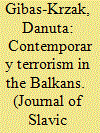

|
|
|
|
|
| Publication |
2013.
|
| Summary/Abstract |
The aim of this article is to examine the terrorism in the Balkans. Contemporary Islamic terrorism in the Balkans is caused by the increase of influences of Muslim fundamentalists, especially in Bosnia and Herzegovina. The origins of Islamic terrorism are connected with radical trend of this religion, which became popular in the society in the period of socialist Yugoslavia. However, this trend could be widespread on a larger scale only when Mujahideen came to Bosnia and Herzegovina to take part in the civil war. In Bosnia and Herzegovina, it was the religious fanatics who mainly participated in the fighting. Many of them were the members of terroristic organizations, such as Al-Qaeda, Hezbollah, Hamas, and Al-Gama'a al-Islamiyya. A considerable number of 'Warriors of Allah' remained on the territory of Bosnia and Herzegovina after the end of the civil war, thus, contributing to the development of the terrorist network connected with radical factions of Islam. The author emphasizes that is essential to take complex actions that aim to fight this threat by international cooperation of special services and the police as a part of the European Union (UE) mission. It is even more important since West Balkans actively participate in the UE and North Atlantic Treaty Organization (NATO) integration processes.
|
|
|
|
|
|
|
|
|
|
|
|
|
|
|
|
| 15 |
ID:
076149
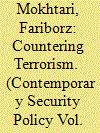

|
|
|
|
|
| Publication |
2006.
|
| Summary/Abstract |
Despite five years of concerted effort to eradicate it, terrorism has managed to taunt us continuously. Understanding terrorism and that which makes a person a terrorist is essential, but will not be enough. Dealing with terrorism is a multi-faceted problem reflecting numerous dimensions, peoples and cultures. To be effective, understanding must translate into wise policies, and policies into actions, carried out with judicious sensibility. The emotional desire to simplify terrorism as a characteristic of a certain culture or geographic region ought to be rejected as misguided and counter-productive. This article suggests a crucial distinction between leaders and recruits, and posits that terrorist movements with political aspirations may be converted. Two case studies, Hezbollah and Hamas, are briefly presented to illustrate that possibility.
|
|
|
|
|
|
|
|
|
|
|
|
|
|
|
|
| 16 |
ID:
174522
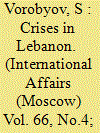

|
|
|
|
|
| Summary/Abstract |
LEBANON is a small Arab state about a quarter of the size of Moscow Province. Throughout its independent development, beginning in November 1943, the country has endured several major crises that jeopardized the existence of its government institutions and the Lebanese state itself.
|
|
|
|
|
|
|
|
|
|
|
|
|
|
|
|
| 17 |
ID:
122942
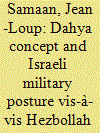

|
|
|
|
|
| Publication |
2013.
|
| Summary/Abstract |
Since 2008, the Dahya concept has been portrayed by journalists, independent experts, and scholars as an official policy of Israel to address the threat of Hezbollah in Lebanon. However, there has been no official Israeli document formulating a Dahya strategy. Although this Dahya concept is not officially endorsed by the Israeli Defense Forces, it is a key reflection of the state of the Israeli military vis-à-vis Hezbollah debate since the 2006 war. This debate reflects a significant evolution of Israeli threat assessment and the remedies for these challenges. It acknowledges not only the political support and military strength of the Lebanese organization, but also its rationality. Conceding the extreme difficulty of dismembering Hezbollah's power, the Dahya concept postulates a deterrence system that, as a matter of fact, finds its roots in traditional Israeli strategic doctrine.
|
|
|
|
|
|
|
|
|
|
|
|
|
|
|
|
| 18 |
ID:
157894
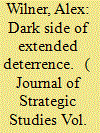

|
|
|
|
|
| Summary/Abstract |
States employ extended deterrence to shield third parties from aggression. The concept is traditionally applied to interstate relations, collective security arrangements, and strategic considerations. The protective relationship that exists between a state sponsor of terrorism and its non-state militant proxy is rarely considered. This article will introduce and explore the sponsor–proxy relationship in the context of extended deterrence, and relate it to Iran’s support and sponsorship of political violence, militancy, and terrorism in Europe. The article reviews the rationale states have for sponsoring terrorism, and illustrates the promises and pitfalls associated with extending deterrence to non-state militants.
|
|
|
|
|
|
|
|
|
|
|
|
|
|
|
|
| 19 |
ID:
098792
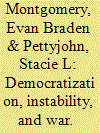

|
|
|
|
|
| Publication |
2010.
|
| Summary/Abstract |
In 2006 Israel resumed military operations in the Gaza Strip and conducted a war in Lebanon following attacks by Hamas and Hezbollah, respectively. Due to the elections that had recently taken place in the Palestinian territories and Lebanon, these events seem to support the argument that democratizing nations are particularly war-prone. Yet the dynamics this perspective identifies as dangerous were largely absent. To address this puzzle, this paper offers three arguments. First, democratization enhanced the power of groups openly hostile to Israel, increasing Israel's perception of threat. Second, democratization was threatening because it occurred within highly divided societies governed by weak state institutions that allowed radical groups to attain political power. Finally, Israel's response to the increased threat posed by these groups was ultimately counterproductive because it further eroded the capacity of the Palestinian and Lebanese governments, heightened polarization within both societies, and therefore exacerbated the same conditions that made democratization threatening to begin with.
|
|
|
|
|
|
|
|
|
|
|
|
|
|
|
|
| 20 |
ID:
186969
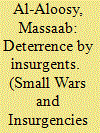

|
|
|
|
|
| Summary/Abstract |
Deterrence between states is a long-established theory in security studies, but it is rare, if not unique, that an insurgency would deter a state from attacking another country. Insurgencies in the Middle East are increasingly playing an international role, of which deterrence is only a part. This generates an interesting dynamic in which an insurgency uses non-traditional tools to dissuade an adversarial state from attacking the group or country in which it resides. Thus, the research topic is: How is Hezbollah able to deter Israel?
|
|
|
|
|
|
|
|
|
|
|
|
|
|
|
|
|
|
|
|
|